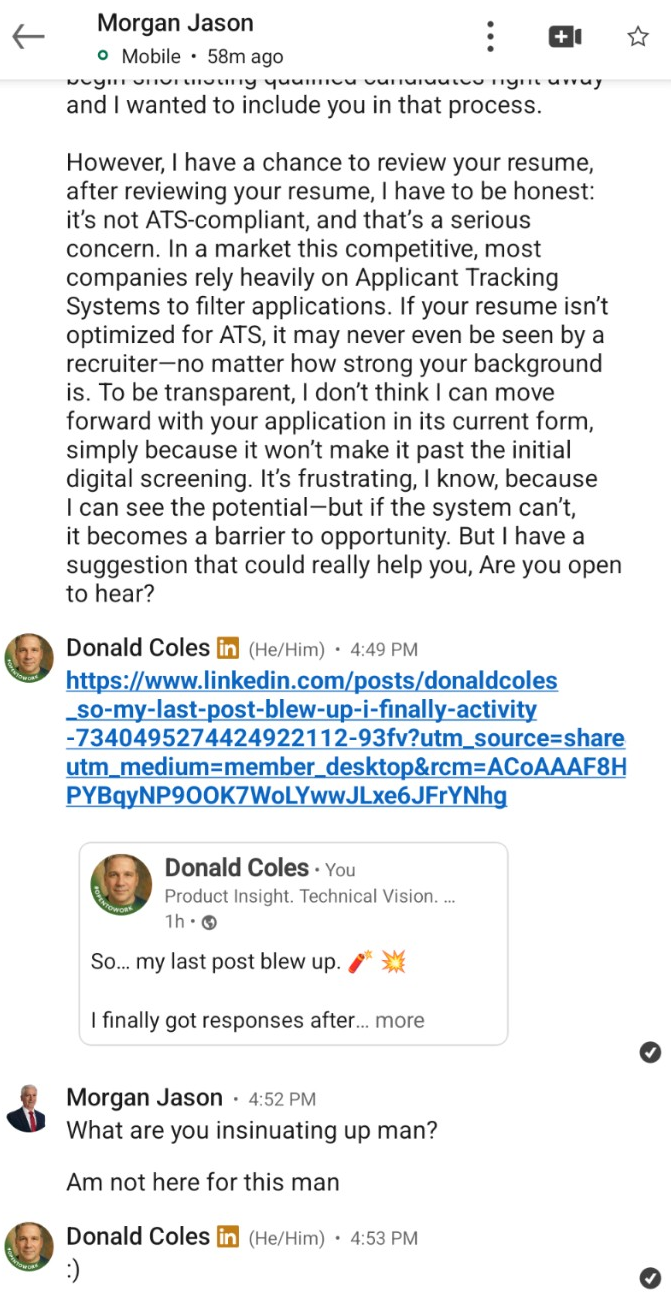False Fires
The first real feedback I've had in my job search turned out to be nothing more than will-o'-the-wisps.

I’ve been looking for a job for six months now.
In that time, I’ve applied to more than 2,000 jobs.
That’s not hyperbole, and it's not a rough estimate. That is a literal, spreadsheet-tracked number. It's also not LinkedIn Easy Apply spam either, at least half of it has been focused directly on employers' own websites.
I’ve also reached out to more than 50 individuals directly. Cold contacts to recruiters. Requests for informational interviews. Networking requests.
And through it all? Nothing.
No responses.
No interviews.
No rejections.
Just the low, mechanical hum of automated ATS emails and digital silence.
I’ve written about the lack of signal in the job market before.
How demoralizing it is to do everything “right” — and still get nothing back.
And for a while, I thought I had already seen the worst of what this economy had to offer.
Turns out, I hadn’t.
Because today, I saw a new level of low.
The Post That Broke Me
I took to LinkedIn and wrote this:
Is anybody even reading this?
That’s the question haunting a lot of job seekers right now. I know it’s been haunting me.2,000+ job applications50–100 cold outreach messages
And from all that? Not “no job offer.”
Not “no interview.”
I mean zero replies.
I know the economy is rough. I’ve been rejected before — that’s part of the game.
But this is different.
This is wondering: Is an actual human even seeing this?
And honestly? I don’t know. And it’s killing me.
It hit a nerve. Righteous frustration, expressed raw and unfiltered.
Within minutes, the post exploded — at least relative to my past posts. Not just impressions either, but what LInkedIn calls "engagements" — comments, shares, likes.
Someone WAS listening!
…Or So I Thought
In the first hour, no less than ten recruiters messaged me. I was ecstatic.
I thought, Finally. Visibility. Maybe this is the turning point.
Each interaction followed a familiar pattern:
Could you tell me more about your professional background?
“What kind of roles are you looking for?”
“What kind of salary expectations do you have?”
None of that is out of the ordinary (although I have a bone to pick with recruiters who think I want to talk about money before I've even see a specific role). It's the same basic questions any recruiter asks me on first contact.
"Would you please share your resume?"
Again, this is nothing out of the ordinary. So I sent them a copy of my full resume, along with the note that I tailor it to specific roles, but this is the overall "verbose" copy.
And then?
“After a quick review, it looks like your current resume aligns with only about 38% of typical job requirements and may be too detailed for modern Applicant Tracking Systems (ATS) and LinkedIn Parsing Systems (LPS). This could significantly limit your chances of getting noticed by recruiters.”
“Consider aligning your resume with the latest TRIX Method—many hiring managers now prioritize this format. Would you like me to connect you with Success? She's helped many professionals land interviews with a 98% success rate.”
“However, I have a chance to review your resume, after reviewing your resume, I have to be honest: it’s not ATS-compliant, and that’s a serious concern. In a market this competitive, most companies rely heavily on Applicant Tracking Systems to filter applications. If your resume isn’t optimized for ATS, it may never even be seen by a recruiter.”
Wait. What?
Scam Script, Disguised as Opportunity
The more "recruiters" contacted, the more obvious the pattern became. And once I recognized the pattern, I couldn’t unsee it. Every single one of these “recruiters” followed the same flow:
- Engage with empathy. "I have a lot of great roles I'm working on, you'll be a great fit."
- Ask background questions. "What’s your target role? What’s your salary expectation?"
- Request the resume. "Can you share your resume? We need to submit it ASAP."
- Deliver a scripted rejection. "Unfortunately, your resume isn’t formatted correctly and won’t pass ATS."
- Insert sales pitch. "Here’s someone I recommend. She’s helped dozens of people land interviews!" (Fiverr link or paid branding service follows.)
It wasn’t genuine interest. Even if it's not outright scamming, it was predatory lead generation with a side of fraudulent pretense.
Targeting vulnerable job seekers in moments of honesty and pain. The emotional equivalent of pushing business cards at a funeral.
Clapping Back
What should you do in this sort of situation?
I don't know what the right answer is, but I can tell you what I did: I wrote about it. I posted about the experience to LinkedIn.
I didn't name names, but I definitely called them out. Pointed out the pattern. Made it clear that I saw them for what they were. And then I linked the post back to each of the fake recruiters.
My favorite interaction was this one. This recruiter had the appearance of a distinguished gentleman, in a suit and tie, and a fancy Senior Talent Executive Recruiting Executie Talent Director title. His initial messages seemed totally normal.
He sent me the usual pitch — complete with dire warnings about my resume’s formatting, and how he had so many great opportunities waiting for me, but just couldn't submit me until I paid for some professional revisions.
I didn’t respond with anger. I didn’t try to argue. I just sent him a link — to the very post he helped inspire. The one warning about him and those like him.
His response?
“What are you insinuating up man?”
“Am not here for this man.”
To which I calmly replied:
“:)”
Sometimes, the quietest answer can be the loudest.

My Resume Is Not the Problem
I’ve spent the last several months tinkering with my resume — tightening the language, improving the clarity, aligning the structure to the roles I’m pursuing. It shows strategic direction, contextual depth, and real results. And I've even talked about how the resume isn't even a particularly good document anymore. It may not be perfect, but a lot of thought has gone into it across many iterations.
What these scammers are preying on is desperation. And that’s what makes this whole thing so insidious.
Because when you’re jobless, burned out, and emotionally raw, you’re looking for any signal that someone sees your value. These predators offer that signal — not to hire you, but to sell to you.
Final Thought
Today has been an interesting day. I started the day without a job, and I am ending the day without a job.
But I have learned a lot.
I thought yelling into the Void was peak frustration, but I was wrong. Silence — a lack of feedback — is not the worst the Void has to offer. Sometimes, the Void tries to pull you in, like a will-o'-the-wisp seducing you further into the swamp. Beware.
There were other red flags, which are easy to spot in hindsight. None of these recruiters could message me until I sent them a connection request. None of them are Premium or Recruiter subscribers. And critically, none of them had more than a half dozen connections themselves.
There’s a difference between being unemployed and being powerless.
You can’t fake your way into meaningful opportunity — but you can hold the line against those who would exploit your hunger for it.
As an amusing coda, I'm pleased to share that I reported each of these accounts to LinkedIn. Several of them have already been removed.
